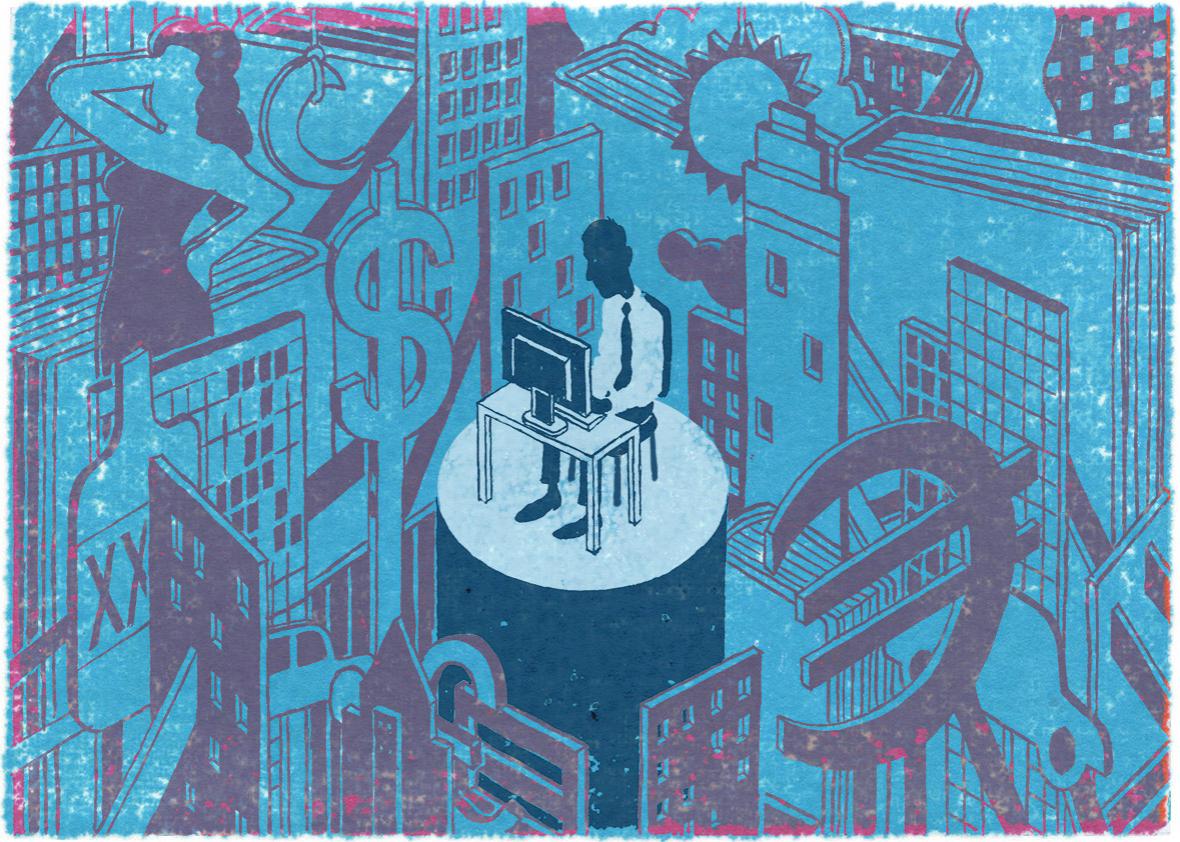You know the premise: A novel about “a modern Everyman, going about his day” in contemporary Dublin. This won’t be one of those books full of dramatic and artificial plot developments—God forbid. Instead it will strive to portray life as most of us actually live it, to convey how it really feels to move through this modern world, without all the bogus, outmoded contrivances of traditional literature.
That’s the pitch, at least, as delivered to Claude Martingale, a young French analyst working for an investment bank in Dublin. Claude, the narrator of Paul Murray’s shrewd new novel, The Mark and the Void, is astonished to learn that the black-clad man who’s been following him around for a couple of weeks isn’t a spy or government agent, but a novelist who wants to make Claude his muse, the source for the main character of his next book.
Murray’s 2010 novel Skippy Dies was a charming, rangy ensemble piece set in a Catholic boy’s boarding school. A whiskey-and-Coke affair, Murray’s fiction combines highly mordant observations on human folly with an almost puppyish enthusiasm for such old-school literary themes and devices as true love, poetic coincidence, climactic catastrophes, and last-minute rescues—all the hokum that a properly highbrow writer is supposed to repudiate. Dropped into our irredeemably unjust world, his characters nevertheless turn out all right in the end. His novels are sharp and sweet, and by some witchcraft Murray keeps their disparate elements from curdling.
Claude excitedly brings Paul’s proposal back to his office in Dublin’s International Financial Services Centre, a streamlined, sterile part of town Claude describes as “a kind of legal elsewhere: multinationals send their profits here to avoid tax; banks conduct their more sensitive activities with the guarantee of a blind eye from the authorities.” His co-workers thrill to the idea that a genuine artist has taken an interest in people like them. (Well, all except for the swaggering, strip-club-frequenting traders. “Everyman!” exclaims one. “Who’s that, the world’s most boring superhero?”) But Paul’s motives are more complicated than he lets on; he soon turns up with a collaborator, a surly Russian “poet,” who starts measuring the office’s walls and inserting cameras into the air-conditioning vents. Soon Paul is telling Claude that there’s a real problem with the book thus far: “Nothing happens.” He explains that “in the past a novel didn’t always need a story. You could just make it about a day in somebody’s life. But life then meant an entirely different thing. It meant people, movement, activity. You guys in front of your screens all day long, selling each other little bits of debt—it’s a whole different order of nothing.” So, he proposes, how about making the hero of this book rob his own bank? Paul fails to account for just how immaterial Claude’s work truly is; investment banks don’t actually store any cash on the premises.
Writers and critics have been arguing about how novelists can keep up with the times and do justice to the unprecedented conditions of contemporary life for about a century now. James Joyce’s Ulysses, the stream-of-consciousness masterpiece The Mark and the Void playfully invokes, stands near the inception of this modernist debate. At our end, there’s only exhaustion. The same year Skippy Dies came out, critic David Shields produced a book-length manifesto, Reality Hunger, in which he declared himself terminally bored with the “invented plots and invented characters” of the novel. “I don’t like to be carried into purely fanciful circumstances,” Shields wrote. “The never-never lands of the imagination don’t interest me that much.”

Photo by Clíona O’Flaherty
The Mark and the Void is one big and very witty joke at the expense of this fusty notion, because even as writers fret over how to get more reality into their novels, reality is becoming more and more fictional. If you want to encounter a never-never land of the imagination, there’s no better place than the market, the ineffable center of real-world power. It’s not just that Paul’s clients trade such phantasmal products as the right to buy something for a particular price at some future date; it’s that most of them, and the bankers who advise them, don’t really understand what they’re doing or how any of it works. Heedless of the lessons of the 2008 crash, they hire the same incompetents and pursue the same policies, assuring themselves that this time around it’s different. Theirs is a world of omens and portents. Their new CEO communicates only in banal proverbs (“All that glitters is not gold”; “A stitch in time saves nine”) that are reverently scrutinized for hidden meanings. Fortunes are made and lost on the basis of unfounded rumor. Demented Russian mathematicians are brought on staff for reasons unclear: “What they do isn’t the point. The point is that this time we’re the ones doing the crazy paradoxical rocket-science shit.”
This has to be the funniest novel ever written about the international banking system—not that there’s a ton of competition. Much of its bite comes from Murray’s weapons-grade one-liners. The “streamlined, frictionless” COO of Claude’s bank has “depthless blue eyes” that “give no impression of personhood, just a serene processing of some external operating system—a Windows of the soul, if you like.” A trader looks like “one of those over-fed, unimaginative rich boys who see the world as a kind of third-rate in-flight movie, to which they will pay attention only until they reach their destination.” A nightclub is “dark and full of strangers, yelling at each other from their private intoxications like monkeys screeching through the bars of their cage.”
Murray hasn’t abandoned his tender side: Claude is a decent guy, in love with the nice Greek waitress who works at the local cafe. He forgives and befriends the skeevy Paul and tries to help him conquer his writer’s block. Some of Claude’s co-workers are OK, too. “People who believe bankers are greedy and inhuman don’t quite understand this,” he explains, “don’t understand that what we are doing now is not what we consider us, merely preparation, scaffolding around the lives to follow.” Each banker has a Number, an amount of money that, once obtained, will free him or her to travel or restore old boats or teach underprivileged children. The problem is, the Number keeps having to be revised upward, receding into the distance no matter how hard they work.
Where Claude’s frail romance feels a bit thin and obligatory, the scenes of him with his colleagues ring with authenticity and close observation. Fans of Skippy Dies will recall that this is Murray’s forte: Conveying the way people talk to each other when they’re thrown together by chance more than choice, the workplace banter and boasting and the trash talk that goes down in the pub afterwards: complaints about mortgages, speculation about higher-ups, flirtations that may or may not be ironic, idle conversations about how you’d survive the apocalypse. The Mark and the Void has a complicated meta overlay—it’s no coincidence that the novelist in the novel has the same name as the novelist who wrote the novel—but all that ends up mattering less than the way the bankers’ humanity sneaks up on you, circumventing prejudices and defenses. They seem so real, and if it’s just a novelist’s trick that conjures that illusion, so be it. The trick still works.
—
The Mark and the Void by Paul Murray. Farrar, Straus and Giroux.
See all the pieces in the Slate Book Review.
Sign up for the Slate Book Review monthly newsletter.
